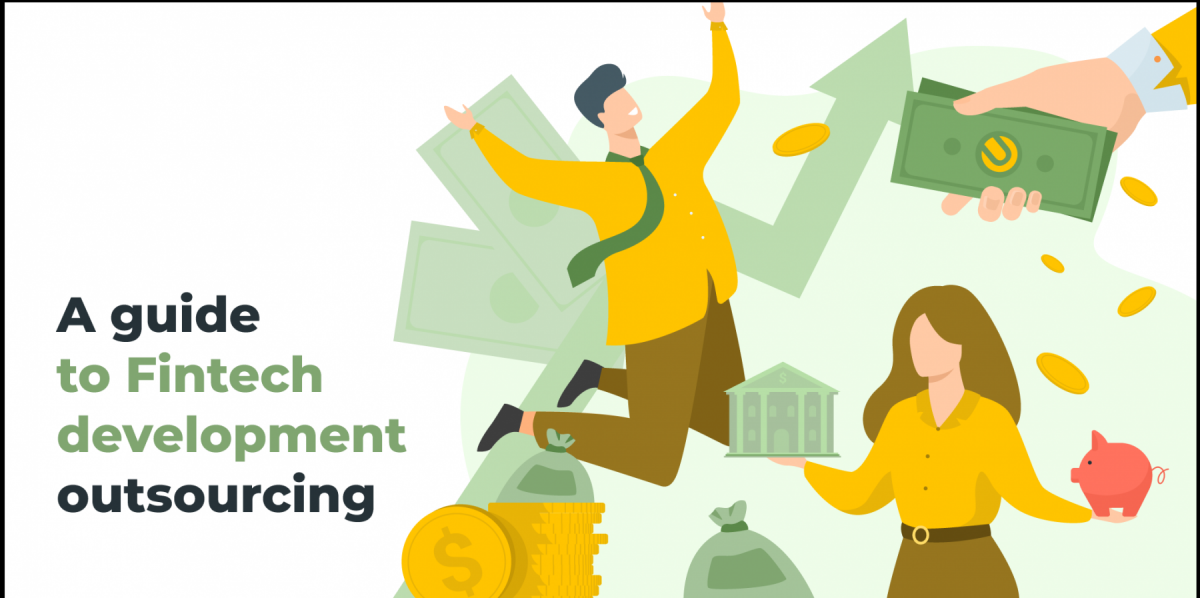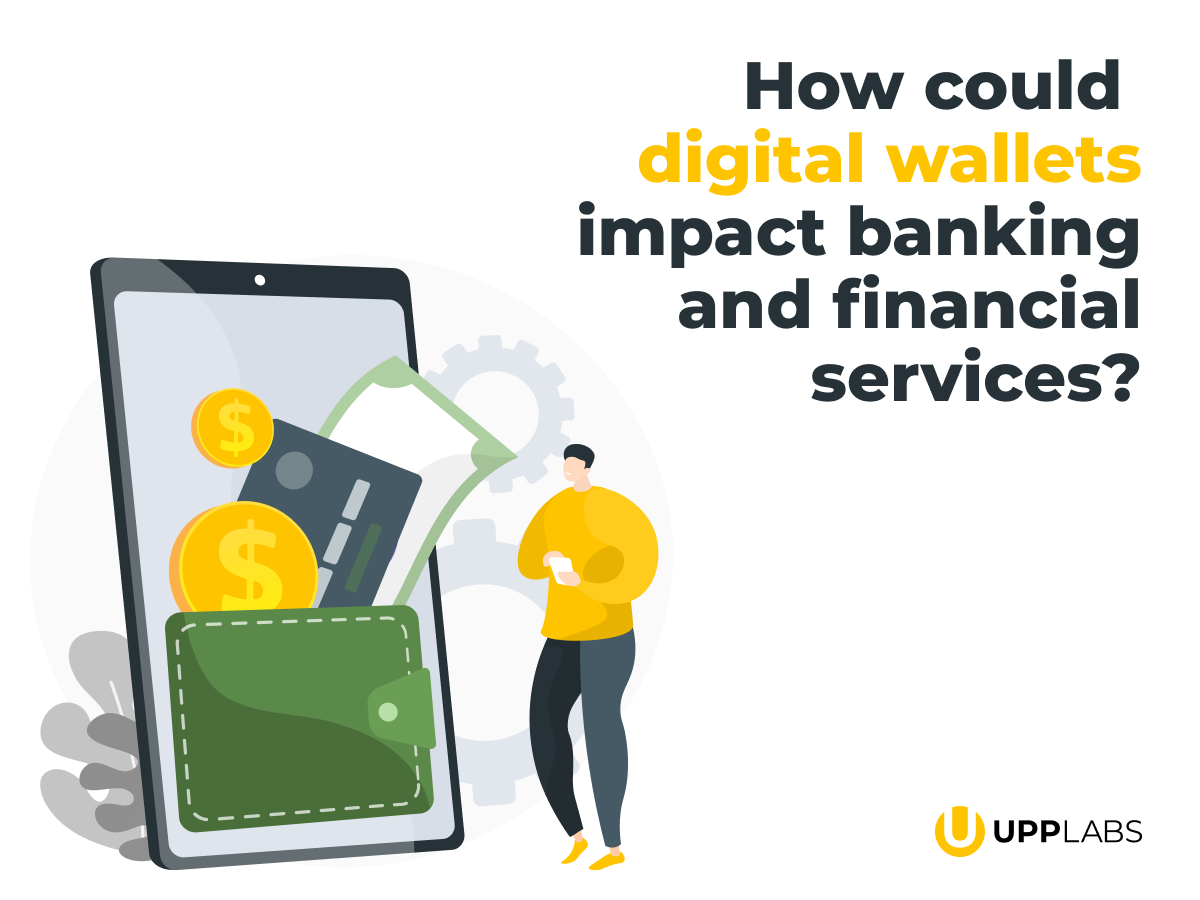Fintech is no longer just a short-term trend. It has become one of the most promising and ambitious markets as the numbers speak for themselves. As for the end of 2021, around 9.000 Fintech startups were in the USA. Meanwhile, the global fintech market value is expected to reach $305 billion by 2025.
To meet high demand, improve efficiency, and quickly adapt to new technologies such as artificial intelligence, blockchain, Internet of Things (IoT), and data science, these Fintech startups are turning to outsource companies to hire specialized technical experts that can create the software. This article provides a detailed guide to Fintech development outsourcing and explains how to choose the right outsourcing Fintech vendor for your product.
1. What is outsourcing?
Outsourcing is the performance of specific tasks or business processes by a third-party organization. It is necessary for the proper functioning of the business as a way to optimize business activities by focusing on core business and transfer of non-core functions and corporate roles to external specialized companies.
Delegating processes are strategically crucial to the outsourcer, as the company makes a mutually beneficial exchange. Why do companies decide to outsource? First, they can spend precious time on the areas accompanying the main activity: software, accounting, maintenance. Outsourcing allows you to entrust the management of these areas to professionals and focus on solving the main strategic and production tasks.
2. Why do companies use outsourcing?
There are many reasons why companies can use the services of remote workers. Here are the most common:
- Saving the internal resources and focusing on the most important goals;
- Attracting skillful professionals from around the world;
- Streamlining or improving the efficiency of labor-intensive functions;
- Cost reduction;
- Maximum use of external resources in development;
- Involvement of employees to perform one-time specific processes.
In the modern world, any company can quickly find the right specialist from around the globe. Many companies from developed and prosperous countries with high wages resort to the work of outsourcers from “third world” countries, where the price of labor is much lower while professionals meet the required level. Large companies often transfer to remote employees some tasks that don’t need special education functions, such as call center or mail processing. It results in avoiding unnecessary costs for office maintenance and more.
3. The benefits and possible challenges of outsourcing for Fintech
The pros of outsourcing for Fintech include the following:
- Cost reduction. The Fintech company saves significant money by using outsourcing in countries with lower production costs: lower cost of living for employees, which means lower wages, as well as lower infrastructure and operating costs;
- Access to the global Fintech talent sector. Outsourcing allows you to attract professionals who may be in short supply or unavailable at the local level;
- Significant time savings. When you work with outsourcing brokers, you do not need to conduct interviews, select and train new employees in your office, which can be very time consuming;
- Focus on main activities. The Fintech startups can focus on core business activities;
- Ability to quickly scale. You can work with new customers and accept new projects without spending time on new facilities;
- Uninterrupted workflow. Your business will operate around the clock due to the time difference between the internal team and the outsourcing team.
If we think of the possible challenges, then we can name such as:
- Time difference. In some cases, this factor can significantly complicate the exchange of information between you and your outsourcing partner;
- Language barriers can lead to misunderstandings and waste of effort. That is why the employer and the outsourcer must know at least one common language;
- Different work habits, which can result from different cultural issues, can interrupt your established work process, and you will need to get used to them.
- Security risk. There is a risk of losing sensitive data.
4. Fintech outsourcing market
Fintech often refers to the combination of finance and technologies used to process business operations and financial services, whether it is software, a service, or a business that implements technologically progressive ways to make financial processes more efficient by introducing traditional methods.
Each Fintech solution can provide software that meets the business’s specific needs.
There are such categories of Fintech software:
- Loan Origination Software
- Commercial Loan Software
- Online Banking Software
- Mobile Banking Software
- Insurance CRM Software
- Insurance Agency Software
- Investment Management Software
- Payment Processing Software
- Personal Finance Software
- Financial Risk Management Software
- Financial Fraud Detection Software
There is hardly one universal reason for outsourcing the Fintech business since each company has its own needs and reasons. However, in most cases, the companies decide to hire a fintech outsourcing vendor to innovate, reduce talent shortages, cut costs, increase speed, or focus on core business.
There are three possible Fintech outsourcing verticals depending on business requirements.
- IT outsourcing (ITO)
IT outsourcing is used in many industries to reduce costs, speed time to market, and free up internal resources for other critical business tasks. IT outsourcing services range from a complete technological infrastructure to developing a specific part of applications. Fintech development outsourcing is becoming a common factor for cloud technology adoption.
2. Business process outsourcing (BPO)
It is common practice to outsource different business-related responsibilities and tasks to third-party vendors. It can be related to accounting, human resources, support, marketing, and other internal operations. It’s essential that fintech outsourcing partners have a similar internal corporate culture and share the same values and goals.
3. Outsourced product development (OPD)
Here, all software development and maintenance processes are outsourced to third-party vendors. The product development outsourcing service provider is responsible for developing the entire product and meeting user needs and business goals.
5. Key Fintech trends
New information technologies and the rapid development of scientific and technological progress directly impact changes in the banking market. In addition, during the quarantine, most banks had to undergo a technological transformation of their business. Users of financial services are gradually moving to the digital sphere, preferring online services. It is the area when you need to apply the latest technology and make changes to your work if you want to be up-to-date.
After traditional banks began to develop their mobile applications, challenging banks offered utterly new tools to attract the audience’s attention: automatic personalized monitoring of costs and virtual assistants. Here, we collected some of the recent trends in the market of digital banking products and their directions of development in 2022.
- Digital banking
Due to the change in consumer habits caused by the pandemic, bank closures are growing. Digital banking offers an improved customer experience and provides faster and more efficient services. Statista estimates that in 2021, 64.6% of US citizens will use online banking, which means that online banking has finally become a transformational tool in finance. Digital banking is more than just cashless payments – the underlying technologies have greatly facilitated the transition from a centralized, traditional banking model to a more distributed, technology-based one.
- White-label Fintech solutions
The supplier makes the products with a white label for rebranding before they are sold. Financial management experiences some difficulties. White-label fintech solutions allow companies of any size to create global payment gateways easily. It is a win-win situation because it provides the distributor with a more extensive customer base and minimizes the reseller’s initial start-up costs.
3. Data aggregation
Data aggregators are increasingly responsible for simplifying data exchange between financial institutions and their customers. Some of them retrieve data from several sources, including investments and credit cards outside the original financial institution. Expect fintech companies to use this transparency to provide additional services to their customers.
Neobank is a Fintech-based bank that operates digitally or via a mobile app and provides banking and payment services without the traditional bank infrastructure. Neobank includes real or virtual payment cards, mobile deposits, individual payments using phone numbers, emails, social media IDs, mobile budgeting tools, and real-time digital receipts.
4. Big data
Each individual creates 1.7 MB of data per second. Financial technology providers and their customers generate vast amounts of data that can be aggregated to provide a better picture of a customer’s financial condition. Expect financial institutions to work with data aggregators so that they can use big data to improve customer retention and service delivery.
5. Blockchain technology
According to predictions published in the Cision PR Newswire report, the size of the global blockchain market will increase from $ 3 billion in 2021 to $ 39.7 billion in 2025. Blockchain is the most significant financial innovation for digital transactions. Its management is distributed, which means that it cannot be controlled by a particular person, company, government, or bank. While companies are concerned about the security of this advanced technology, the growing recognition of the blockchain as a way to create a secure digital registry cannot be ignored.
6. Robotic Process Automation (RPA)
Robotic process automation allows companies to increase efficiency with relatively small investments. RPA uses software robots to free up human resources and improve the performance of routine, repetitive business operations. Now, this technological innovation is estimated at $1.4 billion, and by 2027, according to a study by Grand View, it will reach $ 11 billion.
7. Microcredit
It will help solve various financial problems, such as business development, education, treatment, debt repayment, payment for services, courses, etc. Previously, such loans could be taken from MFIs (Monetary Financial Institutions) at high-interest rates. Modern banks pay special attention to niche microloans. Thanks to online services, there is no need to go to the bank, wait in line, waste time signing papers. You can solve everything in a few minutes, and the money immediately comes to the card.
8. Voice payments
The voice can be a reliable way for individuals and businesses to perform routine banking operations. The convenience of conversation, compared to typing, will help customers quickly get the information they need. Improvements in natural language processing, comprehension, and generation will allow customers to use voice for banking transactions as effectively as they interact directly with the cashier. For example, the WeChat messaging program enables you to make a payment directly in the chat window.
6. How to choose the right outsourcing Fintech company
The most important part of custom Fintech software development is finding the right software project partner. The choice can be daunting with thousands of options, ranging from established development companies to freelancers.
How to make the right choice?
- Pay attention to the experience of the company. Newcomers often have low prices, but the quality of services is appropriate. If the company has been operating for several years, it indicates its experience in different situations.
- Study the company’s website. The site is the face of the company. Notice how informative and understandable it is. Reputable companies usually have service calculators and customer feedback forms on their websites.
- See the list of company partners. It is usually posted on the site. If it has well-known companies in your city or region, this is a significant advantage.
- Read customer reviews. Of course, you should not rely on them entirely, but they will be suitable for making an overall impression.
- Fintech provider lets you make the final employment decision. The clients need to be involved in interviewing candidates and making the final hiring decision.
- The company has a good portfolio of non-standard Fintech development projects. Always check their portfolio page and read all the success stories/research about your industry or product.
- The company complies with the rules and Fintech regulations and works within the framework of your legislation. Professionals should be well aware of the rules regarding the development of Fintech applications in your area, including the laws governing customer data.
- Security testing is built into the company’s SDLC. When evaluating your potential supplier of Fintech developers, make sure they offer security testing in general and penetration testing in particular as part of their software development life cycle.
If you’re looking for a Fintech development partner – there is no point in further search! Check our expertise here.
UppLabs is a perfect companion to lift you Upp!



